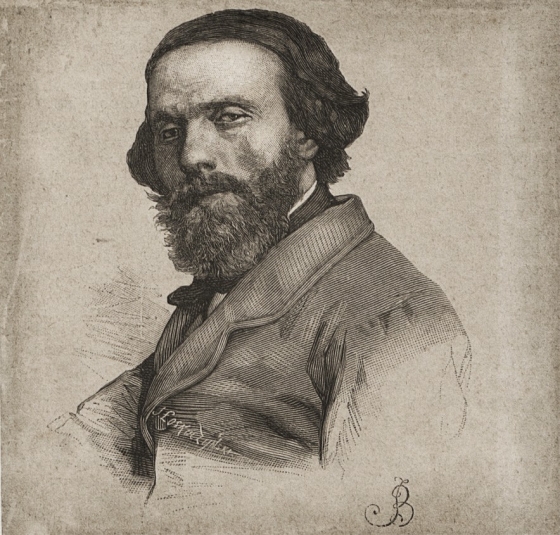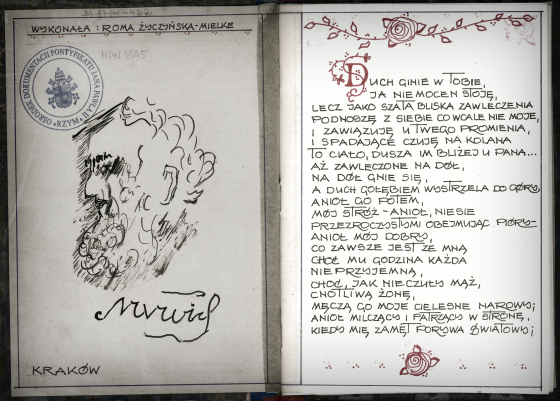John Paul II was deeply conscious that his pontificate as the Polish pope grew out of the history of his Fatherland and the Church on Polish soil. He believed that fulfilling the highest office in the Church he should draw from his Polish experience and refer to the Polish history and culture. He was convinced that his ministry as the Successor of St. Peter may also contribute to the development of Polish culture and its relationship with European and global culture. It was undoubtedly so, as it is, for example, evidenced by an increase of public interest in the figure of Cyprian Kamil Norwid, the poet who held a special place in the spiritual and intellectual formation of Karol Wojtyła. It is worth mentioning that as a high school student, participating in a recital contest, Wojtyła chose fragments of the Norwid’s poem Promethidion. He often referred to the poet and his work in the papal homilies and speeches. It should not be surprising, since he considered Norwid – as he emphasized – “one of Christian Europe’s greatest poets and thinkers”. He confessed on one occasion that with Norwid he was “bound by a deep spiritual kinship since his secondary school years” and that he was “one of his favorite poets”.
It is worth drawing a special “map” of references to Norwid that emerges from the papal teaching. Wherein it should be noted that such references are also present in sermons and pastoral letters of cardinal Karol Wojtyła in his Cracow period.
References to Norwid are mainly in the speeches given by John Paul II during his pilgrimages to Poland. During five of eight pastoral visits, the Holy Father appealed to Norwid in a total of 12 speeches. Moreover, the Pope referred to Norwid during three meetings with the Poles in the Vatican, among which a speech from 1 July 2001 should be particularly stressed; it was devoted entirely to the poet and delivered to representatives of the Institute of National Heritage and also to researchers and lovers of his work. There are also noteworthy references to Norwid that appeared in papal speeches delivered in Italian on the occasion of the Sunday “Angelus”, in a speech addressed to the Italian workers of the mint and printing industries and on the occasion of a Marian celebration in the Piazza di Spagna in Rome or during Stations of the Cross in the Year of the Great Jubilee. It should also be mentioned that in three writings of John Paul II, universal in their character, there are present references to the poet. These are: Letter to the Elderly, Letter to Artists and the book Memory and Identity, published in the year of the Pope’s death.
The fact of more than 20 references to Norwid in papal teaching is in itself significant, but these references differ among themselves in character. In most cases, these are short quotations from poetry or from the so-called Norwid’s aphorisms, woven into reflection developed by the Pope. There are also references to the person and life of the poet or the use of Norwid’s thoughts as the essence of a speech, as it occurred, for example, during a meeting with people of culture and art in Warsaw, in the church of the Holy Cross, in 1987. The Pope appealed to different works: Moja piosnka (My Song), Próby (Trials), Nie tylko przyszłość (Not Only the Future), Memoriał do młodej emigracji (A Memorial to the Young Exile), Pismo (Writing) or Rzecz o wolności słowa (The Thing About Freedom of Speech). Most often, however, he reached for the verses of Promethidion: “What do you know about beauty? … It is the shape of Love. […] Because the beauty is to inspire us to work, and work is to raise us up”. It is worth noting that John Paul II used Norwid’s thought both speaking to the people of culture, as well as to the workers. He showed internal relationships between religion, culture and human dignity that serves the development of humanity.
In Tarnów, during a meeting with Polish farmers, speaking of the need to enhance the status of agriculture work and folklore, he quoted a passage from Epilogue in Promethidion: “Raising folk inspirations to a power penetrating and embracing all humanity – raising the folklore to Humanity … – must be according to Norwid – through maturity”. The Pope also said other words of the poet (from Pismo), that the farmer “with one hand making for us bread, the other a well of fresh thoughts brought from heaven”. The crowd of nearly one million people started clapping. The Pope summed it up: “Thank you for the applause for Norwid. He suffered a lot in his life, including an exile. I rejoice that today he is being applauded by the farmers […] for his great Christian, homeland and national wisdom”. Publishers, researchers and lovers of Norwid’s work passed to the Holy Father all sorts of publications and studies on his “favorite poet”. Many of these gifts, with the dedication of donors, there are in the collections of the Centre for Documentation and Research of the Pontificate of John Paul II in Rome. The most striking of them is a manuscript of Norwid’s poem Na smętne wieści z Watykanu (On the Gloomy News from the Vatican), written after the death of Pius IX. The manuscript was donated to the Pope by Prof. Wiktor Gomulicki.
It is also worth mentioning a gift received by the Holy Father during his visit in Kraków in 1983. It was a carefully handwritten and bound book of Norwid’s Litania do Najświętszej Panny Marii (Litany of the Blessed Virgin Mary) with beautiful ornaments and graphics showing the poet’s head. Let us recall that Litania was created during Norwid’s stay in Rome and is evidence of his spiritual transformation and prayer before the image of Mary, Mater Admirabilis, located in one of the churches of Rome. On the last sheet a donor wrote down :“Holy Father! When you were in Poland in 1979, after your blessing, a miracle happened! God showed me mercy. After 36 years of my separation from God – He wanted to enter my soul. […] Please, accept this humble gift. […] May Your blessing consolidate my faith in God!”. Probably the donor, like John Paul II, was also a lover of Norwid and, just like the Pope, she was discovering in the poet’s work a space to express what is deepest in a human being, the desires of the soul and mind that only God can satisfy. It should be noted that the Holy Father received in 2001 from the Norwid Foundation, a medal for his contribution in promoting the work of our great poet. Without a doubt, John Paul II drew the attention of many people and of different nationalities to the figure and work of Norwid. Norwid could not suppose that one of his compatriots not only did not omit his writings, but himself absorbed them, made the poet’s legacy spiritually fruitful and included it in the papal and Church teaching. Norwid could not imagine such a “return” to Rome. Inscrutable are the ways of Divine Providence.
Fr. Andrzej Dobrzyński

